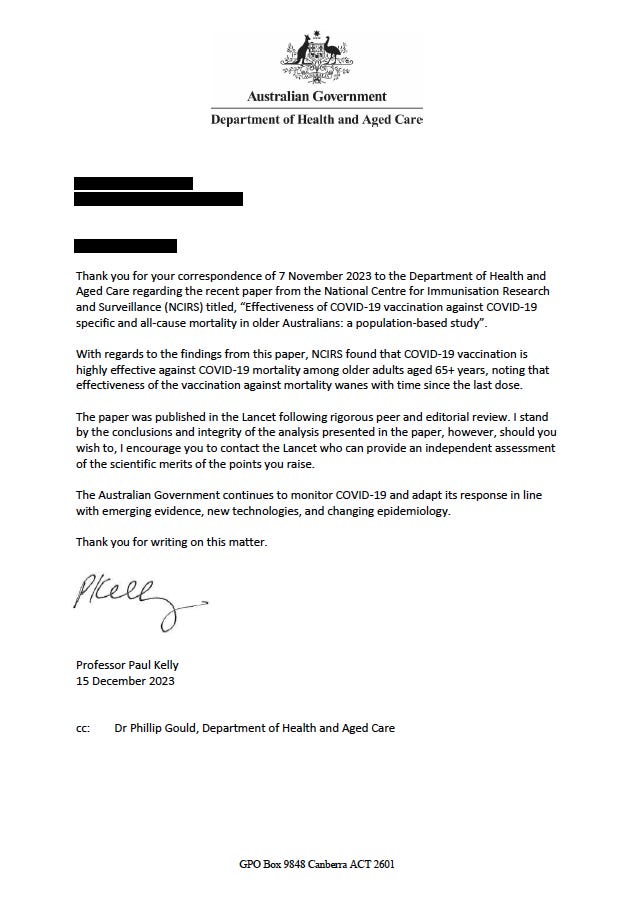Professor Paul Kelly, Australia's Chief Medical Officer, Replies to Our Open Letter
And we respond.
On 7 December, 2023, we sent an open letter to Australia’s Chief Medical Officer, Professor Paul Kelly, and Doctor Philip Gould, First Assistant Secretary, Health Economics and Research Division requesting correction or clarification of their public statements referencing a National Centre for Immunisation Research and Surveillance study endorsing the safety and effectiveness of booster vaccination.
The "Science" Behind the Headlines (continued)
An open letter to Australia's Chief Medical Officer and First Assistant Secretary, Health Economics and Research Division at Australian Department of Health and Aged Care.
Whilst Professor Kelly has unequivocally affirmed his support for the conclusions and “integrity of the analysis” of the study, we have requested further correction and clarification in our open letter sent today:
“Dear Professor Kelly and Doctor Gould,
Thank you for your response of 15 December to my letter raising concerns about your statements made in relation to the NCIRS study, “Effectiveness of COVID-19 vaccination against COVID-19 specific and all-cause mortality in older Australians: a population-based study.”
Though your response was generally responsive to the concerns I raised, I would like to reiterate and seek clarification on key points that were not directly addressed in your reply to my letter.
Request for further clarification, correction or comment:
Evidence contradicting the study’s conclusions: While I appreciate your confidence in the study's conclusions and the integrity of its analysis, the study presents data that contradicts its conclusions:
Vaccine harm was evident for specific cohorts (as highlighted in my letter of 7 November).
These cohorts who experienced worse mortality outcomes and negative vaccine effectiveness included the recent two dose recipients, contradicting the study’s conclusion that vaccination effectiveness waned over time.
The evidence of negative vaccine effectiveness for these specific cohorts outlined in my 7 November letter has been confirmed in my correspondence with the study’s lead author, Dr. Bette Liu. She did not, however, explain why the evidence of vaccine harm had no impact on the study’s overall conclusion to endorse booster vaccination.
Access to AIR-MADIP Dataset: My request for access to the AIR-MADIP dataset for independent analysis was not addressed in your response. This access is crucial for transparent and comprehensive analysis, however, access to this dataset is not currently available to independent researchers. The data could be used by independent researchers to validate the conclusions of the study and also broaden the analysis beyond the study exclusions (exclusions were those aged less than 65 years old, those who received five or more doses, those who received only one dose, those who were vaccinated within 0-7 days or those with “significant missing data”). I propose making the dataset available for researching the causes of Australia's excess mortality. This is a matter of national importance, and I, among many others, are keen to pursue this matter to definitively rule out the role of COVID-19 vaccination in Australia’s excess mortality. If there is absolute confidence in the safety and effectiveness of COVID-19 vaccination, it makes perfect sense to allow independent researchers to access this deidentified data to exonerate COVID-19 vaccines.
Other matters:
I acknowledge that you have not solely relied on the rigorous peer and editorial review for your assessment of the conclusions and integrity of the analysis in the study. On this point, I note that you have both made similar comments promoting the study and its conclusions in June 2023 at Senate Estimates for the Community Affairs Legislation Committee, before this study was published in the Lancet. It is implied, however, that publication in the Lancet adds credibility to the study. While peer review is a critical component of scientific discourse, it is not infallible. No journal, regardless of its stature, is immune to the problems and biases inherent in the publication process. This very fact underscores the importance of critically analysing the data ourselves, especially when the data presented in the study appears to contradict the conclusion that COVID-19 vaccines are “entirely and incredibly effective”.
Summary:
While the study concludes that COVID-19 vaccination is effective in certain cohorts, the evidence of negative effectiveness in other cohorts cannot be overlooked. As leaders in Australia's pandemic response, your insights are crucial in interpreting these contradictions. Clear guidance from you is necessary to ensure that public health messaging around the safety and efficacy of COVID-19 vaccination is accurate and reflective of all the study’s findings, not just its conclusion about booster vaccination. Our discussion must be based on the data presented in the paper itself, much of which appears to contradict your public statements.
Could I once again respectfully request a clarification or correction to the public statements made by yourself and Dr. Gould, as outlined in my letter of 7 November 2023 and summarised in this correspondence.
Thank you once again for your time and consideration, I look forward to your response.
Yours sincerely,
______________________________
Community Affairs Legislation Committee, https://parlinfo.aph.gov.au/parlInfo/download/committees/estimate/26915/toc_pdf/Community%20Affairs%20Legislation%20Committee_2023_06_01_Official.pdf;fileType=application%2Fpdf#search=%22committees/estimate/26915/0000%22, 1 June 2023, pages 14, 23, 41 and 42.
Retraction Watch Database http://retractiondatabase.org/RetractionSearch.aspx#?jou%3dLancet
https://www.thelancet.com/journals/lancet/article/PIIS0140-6736(20)31180-6/fulltext”
We will update you with any future response from Professor Kelly and Doctor Gould.
In the meantime, Merry Christmas!



